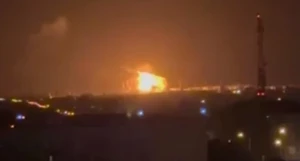
Mixed results of this year's Davos
A little about Zelenskyy's speech in Davos: tough rhetoric, hopeful expectations
Zelenskyy's position "No negotiations - Russia is incapable of negotiating" is generally tough but realistic. This is a fact that was confirmed on January 17 by the statement of Russian Deputy Security Council Chairman Medvedev: no signed "papers" will prevent Russia from continuing to wage war and destroy Ukrainians as a nation and Ukraine as a state. It is difficult to say whether the representatives of the partners have already realized this. However, judging by Davos, the majority still believe that negotiations and a peace agreement are the final element of the situation. That is, they have not yet accepted the reality of confrontation with an uncivilized aggressor.
The assertion that "It will be very difficult without Western assistance" is undeniably true. On one hand, the thesis extrapolates with predictions that suggest, "If Ukraine no longer serves as a buffer between you and Russia, you may face direct attacks, and your citizens could be thrust into the front lines." The conspicuous declarations from Poland, Sweden, the Baltic states, the United Kingdom, Finland, and even Germany indicate a tacit acceptance of the looming possibility of a Russian assault. Meanwhile, national military industries are gradually gaining momentum. On the other hand, European governments are grappling with substantial electoral inertia, as citizens have yet to perceive a Russian attack as a personal threat. Consequently, authorities must consider this public sentiment, as evidenced by the recent decision in the Bundestag to withhold the delivery of Tauruses to Ukraine.
In other words, they hear Ukraine and Zelenskyy, but their own electoral realities still prevail. Moreover, statements like "we'll fight even with shovels" (as stated by the Ukrainian FM - ed.) are somewhat dampening the urgency for assistance, suggesting that while help is desired, it may not be immediately critical, and Ukrainians believe they can cope for the time being. We should not rush to make decisions and not dismiss our own needs as force majeure.
Additionally, we need to consider the fundamental paradigm of the West in this war: the objective is to weaken Russia enough until NATO's defense capabilities are fully prepared, which may take 3 to 6 years. Consequently, their goal is to prevent Russia from evading the Ukrainian trap within this timeframe—not necessarily to secure a swift victory for Ukraine. Although this is also not against their interests. If Ukraine succeeds, it would be fine as well.
A speech to investors is just as motivational, but it lacks a solid foundation. All the positive agreements hold no significance without substantial internal changes in Ukraine. Primarily, this pertains to combating corruption, or at the very least, constraining it. It also involves streamlining the excessively bureaucratic functions of the state and minimizing its interference in business matters, evident even in the military-industrial complex, as seen in recent scandals involving state auditors. Additionally, attention must be directed towards the judicial system—not only focusing on its independence but also addressing issues like casteism and the presence of a "state within the state" operating outside legal boundaries and driven solely by financial motives.
Under our current circumstances, only Chinese investors may find our conditions favorable for major business ventures. However, it's crucial to bear in mind that China doesn't truly engage in "investments" in the conventional sense. It simply buys a country, its territory (which again refers to the statements of government officials about China as a partner, which are quite dangerous).
Overall, the takeaway from Zelenskyy's Davos visit is not overwhelmingly negative. The key point is that the Kremlin's narrative suggesting "the West is tired of Ukraine" is evidently far from the truth. The global focus is not on Russia's victory, as it is widely recognized that such an outcome would directly harm other nations and potentially lead to more severe events. Therefore, Ukraine is not being abandoned without support. However, as anticipated, the conditions for assistance have indeed become more stringent, and the level of support has decreased.
One more point: Europe has realized and accepted that it will have to compensate for all the aid that the United States will no longer provide. This is also a plus for us.
But, all things considered, the situation is now being resolved on the battlefield, not in offices. In the military, not in the political or economic sphere. Politicians have been able to cope for too long. But the allies have seen that they can rely on the military.
This leads us to expect a new round of confrontation between the political and military leadership within Ukraine... This is the mixed result of this year's Davos.
About the author. Oleksiy Holobutskyi, political scientist.
The editors do not always share the opinions expressed by the blog authors.
- News














































